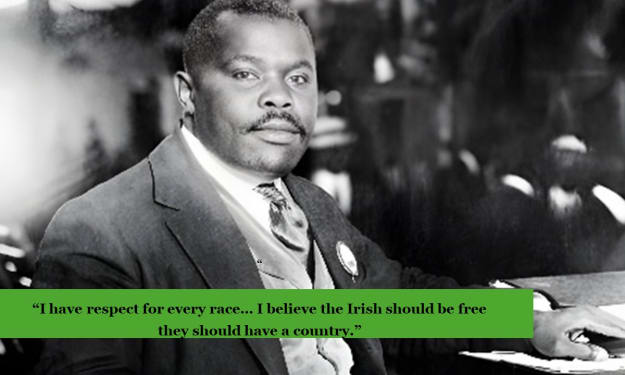
Geoffrey Philp
Bio
I am a Jamaican writer. I write poems (haiku & haibun), stories & essays about climate change, Marcus Garvey, music icons such as Bob Marley, and the craft of writing. For more info, visit my webpage: https://www.geoffreyphilp.com/
Stories (79/0)
Beyond Talent
Writers constantly grapple with balancing craft against life's demands, seeking a formula for consistent production while nurturing creativity. The stark reality of living solely from writing underscores the need for such a framework. The U.S. Bureau of Labor Statistics reported approximately 151,200 writers and authors in 2023, yet only an estimated 10-20% earn a full-time living solely from their writing. Most supplement their income through teaching, freelance work, or other fields. These statistics highlight writers' challenges and the importance of intentionally structuring one's life to support creative pursuits. So, how do we create a framework that will allow us to work and create in our calling?
By Geoffrey Philp 23 days ago in Writers
Rewriting the Saijiki
According to scientists such as Paul Crutzen and Eugene Stoermer, we are now in the Anthropocene, a proposed geological epoch defined by human impacts on the environment. In an article published last year in The Guardian, the effects of climate change on the traditional Japanese poetic form of haiku highlighted the challenges and opportunities faced by contemporary haiku poets ("Lost to the Climate Crisis: Japan Haiku Poets," The Guardian, 2023).
By Geoffrey Philp 3 months ago in Poets
Inshallah. Top Story - May 2024.
Istanbul is a city bristling with life, a place where past and present, sacred and profane, intertwine under the watchful gaze of the Sultan Ahmet Mosque. As I explore this crossroads of cultures with Maya, my nine-year-old niece and the daughter of my late brother-in-law Frank, and my wife Nadia, Frank's sister, I find myself on a journey not just through Istanbul's history, but also into the depths of my own beliefs. Staying with Maya and her mother Elvan, my sister-in-law, I begin to see the city anew through their eyes, and to understand why James Baldwin said it "revived" him.
By Geoffrey Philp 3 months ago in Wander
Occupying Liminal Spaces
In his groundbreaking work, Man's Search for Meaning, Viktor Frankl, an Austrian neurologist, psychologist, and Holocaust survivor, advanced an idea central to his philosophy of freedom and finding meaning and purpose: "Between stimulus and response, there is a space. In this space, it is our power to choose our response. In our response lies our growth and our freedom” (Frankl). Like a threshold, that liminal space Frankl describes is the territory of haiku—a betwixt and between world brimming with potential. But in our mad rush towards whatever beckons, we often fail to notice the moments where life undergoes subtle changes amid the noise and commotion of the world.
By Geoffrey Philp 3 months ago in Poets
Paper Trails
Sitting at the desk in my room at the Çırağan Palace Kempinski, I hold the letter--feeling the rough paper between my fingers. It has taken twenty years for this letter from David to arrive, and it has found me in a hotel in Istanbul, where I'm to receive a silver medal for my latest book on climate change.
By Geoffrey Philp 3 months ago in Fiction
Sleepless Nights and Autumn Roads
Haiku can transform heightened moments into existential insights. Richard Wright, the renowned African American novelist, turned to haiku later in his life and produced startling haiku while battling dysentery. Written in the final year of his life, Wright's haiku in The Last Poems of an American Icon show a perspective shift, blending natural imagery with introspective thoughts to reveal perceptions about time, longing, solitude, and the natural world. In haiku, such as "A Sleepless Spring Night" and "Autumn Moonlight," Wright takes simple scenes from nature and everyday life to unveil observations from the perspective of a dying man embracing life's end. Through thoughtful structural choices, Wright uses haiku's brevity to link the physical world with the emotional and spiritual realms.
By Geoffrey Philp 3 months ago in Poets
Radical Amazement
Since I began writing haiku, I've found guidance in the teachings of an amazing teacher. No, it's not Bashō or any other renowned haiku master. It's Rabbi Abraham Joshua Heschel, a religious philosopher who marched alongside Dr. Martin Luther King Jr., Amelia Boynton, and John Lewis at Selma. In reflecting on that historic march, Heschel said, "Our march was worship. I felt my legs were praying" (Stern). According to Heschel, contemporary Western society lacks the sense of wonder and awe essential for spiritual growth (Heschel). He advocates for living with “radical amazement,” —no doubt linked to the idea of emuna or living in the presence of Hashem-- urging individuals to view the world through fresh eyes each day and acknowledge the extraordinary in the ordinary: "Our goal should be to live life in radical amazement... Get up in the morning and look at the world in a way that takes nothing for granted. Everything is phenomenal; everything is incredible; never treat life casually. To be spiritual is to be amazed" (Heschel). This concept of “radical amazement” has become the cornerstone of my creative process, leading me to explore the haiku of poets such as Chiyo-ni, Shiki, and Santōka Taneda, whose haiku embody the ideas described by Rabbi Abraham Joshua Heschel - the ability to view the world with a sense of wonder and discover profound beauty and meaning in everyday moments.
By Geoffrey Philp 4 months ago in Poets
Marcus Garvey and the Irish Connection
The remarkable success of the Universal Negro Improvement Association and African Communities (Imperial) League (UNIA-ACL), led by Marcus Mosiah Garvey (1887-1940), the first National Hero of Jamaica, drew inspiration from various sources. While Booker T. Washington's vision of self-help through education and economics was a primary influence, Garvey's organizational strategies for the liberation of people of African descent closely mirrored the slogans and methods employed by Irish nationalists such as Padraig Pearse, Robert Emmet, Roger Casement, and Eamon de Valera.
By Geoffrey Philp 4 months ago in The Swamp
Subscribe to my stories
Show your support and receive all my stories in your feed.
Send me a tip
Show your support with a small one-off tip.




















